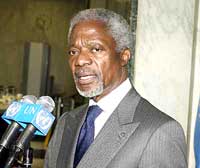
An interim report , released on Thursday, zeroed in on the chief of the UN oil-for-food program, Benon Sevan, saying Saddam Hussein's regime awarded oil allocations in his name to a trading company between 1998 and 2001.
It said Sevan had "seriously undermined the integrity of the United Nations" and suggested he may have received kickbacks, possibly using an aunt to mask his trail.
Based on the report, Secretary-General Kofi Annan will discipline Sevan and another UN official, Joseph Stephanides, who may have "tainted" bidding for an oil-for-food contract, said Mark Malloch Brown, Annan's chief of staff.
The US$60-billion oil-for-food program ran from December 1996 to November 2003 and allowed Iraq, which was bound by sanctions, to sell oil to buy humanitarian supplies. But it allegedly became a way for Saddam to curry favor and push to end sanctions - by awarding former government officials, activists, UN officials and journalists vouchers for Iraqi oil that could then be resold at a profit.
Allegations that the United Nations was enmeshed in corrupt practices in the program led Annan to appoint former Federal Reserve Chairman Paul Volcker to investigate, and several US congressional teams also are looking into it.
Volcker's report
Volcker said that the investigation found no "systematic mismanagement" of the oil-for-food program, but said there were serious problems.
He said he hoped his report, which detailed investigations into UN administrative expenses, internal audits and procurement, would begin to answer some of the serious questions raised by critics of the United Nations.
"There are obviously problems in the institution and we have identified some of them," he said. "But the end of this should be a reformed and stronger UN, because I believe - and I know the other committee members believe - that the UN has an important role to play but it cannot be effective if it is under suspicion all of the time."
Volcker's investigators are still looking at Annan and his son, Kojo, who had been employed by a Swiss company, Cotecna Inspection SA, which had a UN contract to certify deals under the oil-for-food program. Volcker is expected to issue a report on that investigation later this winter.
Additional wrongdoing could be exposed when Volcker's commission releases a final report by midyear.
Investigators are still looking into the actions of the UN Security Council, which authorized and monitored the oil-for-food program, as well as the performance of UN contractors and the activities of UN agencies in the field in Iraq. "It is not the whole story by a long shot," Volcker said at a news conference to release the report.
'Unexplained wealth'
Despite Sevan's claims that he never recommended any companies for oil vouchers, Volcker's Independent Inquiry Committee said it had evidence that Sevan asked Iraq to give a small Swiss-based oil company, African Middle East Petroleum Co Ltd Inc the opportunity to buy oil. The company, known as AMEP, received the allocations and earned US$1.5 million from them.
The report did not say Sevan received kickbacks, but said it was suspicious of US$160,000 he said he received from his aunt in his native Cyprus from 1999-2003. The report questioned this unexplained wealth, noting that his aunt, who recently died, was a retired Cyprus government photographer living on a modest pension.
The report said Sevan's solicitations on AMEP's behalf "presented a grave and continuing conflict of interest, were ethically improper, and seriously undermined the integrity of the United Nations."
It also noted that Sevan had been uncooperative with investigators by changing his story and sometimes not responding promptly to interview requests.
The report also found "convincing and uncontested evidence" that selection of the three UN contractors for the oil-for-food program - Banque Nationale de Paris, Saybolt Eastern Hemisphere BV, and Lloyd's Register Inspection Limited - did not meet established financial and competitive bidding rules.
Paris-based BNP was chosen by former Secretary-General Boutros Boutros-Ghali to be the program's banker without meeting the UN requirement to accept the "lowest acceptable bidder," the report said.
The competitive bidding process for a company to monitor Iraqi oil exports was manipulated by Allan Robertson, who was in charge of the UN procurement department, so Saybolt could lower its bid and win the contract, the report said.
For the inspection of humanitarian goods, the report said, there was a clear early preference for Lloyd's and the competitive bidding process was "tainted" by Stephanides.
His contacts with an unnamed UN mission led to Lloyd's winning the contract even though there was a lower bidder, it said.
Asked whether the committee found any criminal wrongdoing, Volcker said: "We are not a criminal tribunal. Other people will have to draw conclusions from the facts that we have presented."
Annan shocked
"The secretary-general is shocked by what the report has to say about Mr Sevan," Annan's chief of staff Brown told a news conference. "He very much doubts there can be any extenuating circumstances to explain the behavior, which appears proven in the report."
But he noted: "we got a thumbs up" on administration of the programme and Iraq should be encouraged that the funds were used as intended.
Annan said the United Nations was still deciding how to discipline Sevan, but it wasn't clear how much it can do. Sevan is officially retired, though he is still being paid a token salary of one dollar a year so he is available to investigators.
(China Daily February 5, 2005)
|

